往年例题英语写作
高考英语作文 例题加范文5篇

高考英语作文例题加范文5篇1. 题目:假设你是李华,你的美国朋友Tom计划暑假来中国学习汉语。
请你给他写一封邮件,告诉他如何学好汉语。
范文:Dear Tom, I'm so glad to hear that you're planning to come to China to learn Chinese during the summer vacation. Here are some suggestions to help you learn Chinese effectively. First and foremost, it's important to find a good language school or institute that offers Chinese courses for foreigners. They usually have professional teachers who can provide systematic and comprehensive language training. Additionally, it's essential to practice speaking Chinese as much as possible. Try to communicate with local people and make Chinese friends, who can help you improve your language skills. Moreover, immersing yourself in the Chinese culture can greatly enhance your language learning experience. Visit historical sites, try local cuisine, and participate in traditional activities to gain a deeper understanding of the language and its cultural context. Lastly, don't forget to use online resources and language learning apps to supplement your studies. They can provide additional exercises, vocabulary lists, and interactive materials to support your learning journey. I hope these tips will be helpful to you. Wish you a successful and enjoyable Chinese learning experience in China! Best regards, Li Hua2. 题目:假设你是李华,你的朋友Tom最近沉迷于手机游戏,学习成绩下降严重。
高考英文作文例题
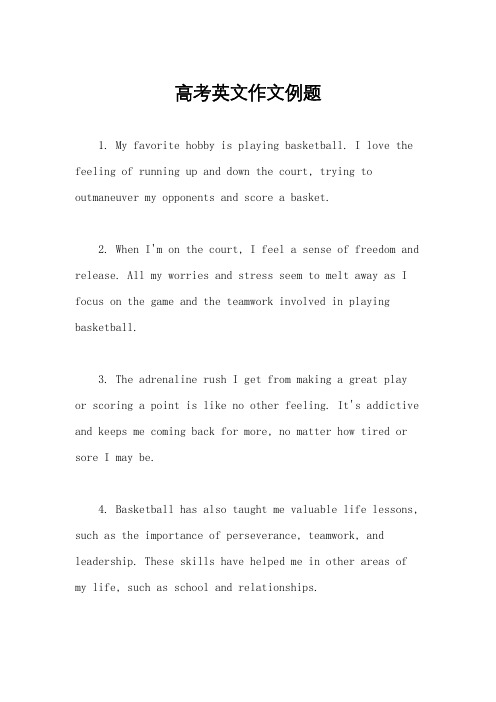
高考英文作文例题1. My favorite hobby is playing basketball. I love the feeling of running up and down the court, trying to outmaneuver my opponents and score a basket.2. When I'm on the court, I feel a sense of freedom and release. All my worries and stress seem to melt away as I focus on the game and the teamwork involved in playing basketball.3. The adrenaline rush I get from making a great play or scoring a point is like no other feeling. It's addictive and keeps me coming back for more, no matter how tired or sore I may be.4. Basketball has also taught me valuable life lessons, such as the importance of perseverance, teamwork, and leadership. These skills have helped me in other areas of my life, such as school and relationships.5. I also enjoy the social aspect of playing basketball. Whether it's with friends at the park or with a team in a league, the camaraderie and friendly competition make the experience even more enjoyable.6. Overall, basketball is more than just a hobby for me – it's a passion. I can't imagine my life without it, andI look forward to many more years of playing and improving my skills on the court.。
历年英语一作文真题
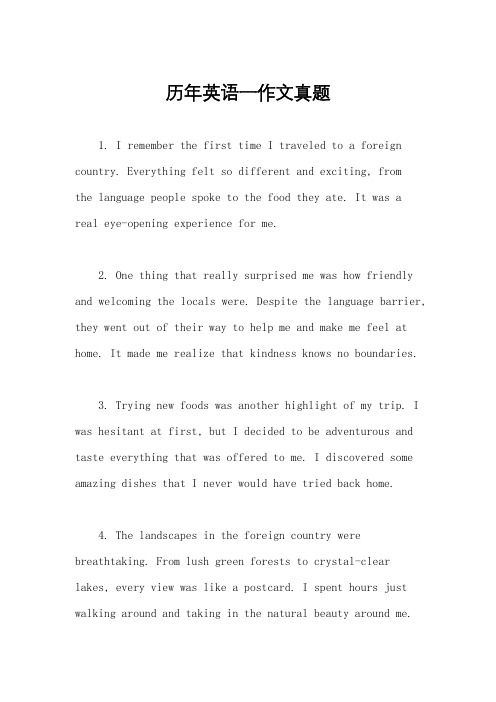
历年英语一作文真题1. I remember the first time I traveled to a foreign country. Everything felt so different and exciting, fromthe language people spoke to the food they ate. It was areal eye-opening experience for me.2. One thing that really surprised me was how friendly and welcoming the locals were. Despite the language barrier, they went out of their way to help me and make me feel at home. It made me realize that kindness knows no boundaries.3. Trying new foods was another highlight of my trip. I was hesitant at first, but I decided to be adventurous and taste everything that was offered to me. I discovered some amazing dishes that I never would have tried back home.4. The landscapes in the foreign country were breathtaking. From lush green forests to crystal-clear lakes, every view was like a postcard. I spent hours just walking around and taking in the natural beauty around me.5. One of the most memorable moments of my trip was when I stumbled upon a local festival. The music, dancing, and vibrant colors were unlike anything I had ever seen before. I joined in the festivities and felt like I was truly part of the community.6. As I boarded the plane back home, I couldn't help but feel grateful for the incredible experiences I had during my trip. It opened my eyes to new cultures, people, and ways of life. I knew that I would carry those memories with me forever.。
高中英语 高考英语作文 例题加范文5篇
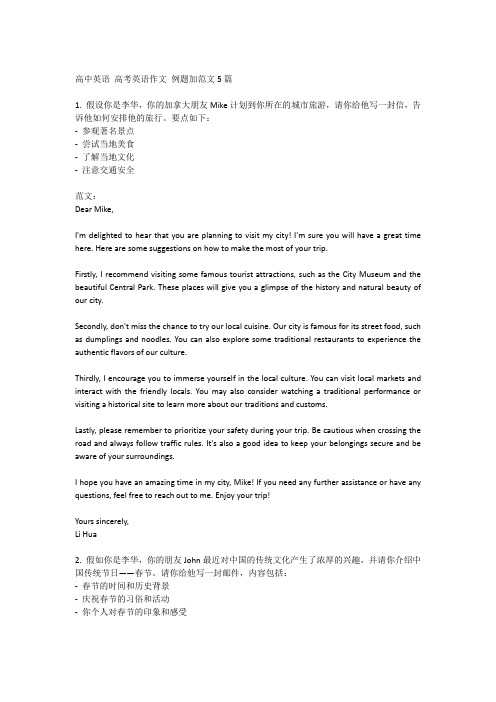
高中英语高考英语作文例题加范文5篇1. 假设你是李华,你的加拿大朋友Mike计划到你所在的城市旅游,请你给他写一封信,告诉他如何安排他的旅行。
要点如下:-参观著名景点-尝试当地美食-了解当地文化-注意交通安全范文:Dear Mike,I'm delighted to hear that you are planning to visit my city! I'm sure you will have a great time here. Here are some suggestions on how to make the most of your trip.Firstly, I recommend visiting some famous tourist attractions, such as the City Museum and the beautiful Central Park. These places will give you a glimpse of the history and natural beauty of our city.Secondly, don't miss the chance to try our local cuisine. Our city is famous for its street food, such as dumplings and noodles. You can also explore some traditional restaurants to experience the authentic flavors of our culture.Thirdly, I encourage you to immerse yourself in the local culture. You can visit local markets and interact with the friendly locals. You may also consider watching a traditional performance or visiting a historical site to learn more about our traditions and customs.Lastly, please remember to prioritize your safety during your trip. Be cautious when crossing the road and always follow traffic rules. It's also a good idea to keep your belongings secure and be aware of your surroundings.I hope you have an amazing time in my city, Mike! If you need any further assistance or have any questions, feel free to reach out to me. Enjoy your trip!Yours sincerely,Li Hua2. 假如你是李华,你的朋友John最近对中国的传统文化产生了浓厚的兴趣,并请你介绍中国传统节日——春节。
历年大作文英语一题目
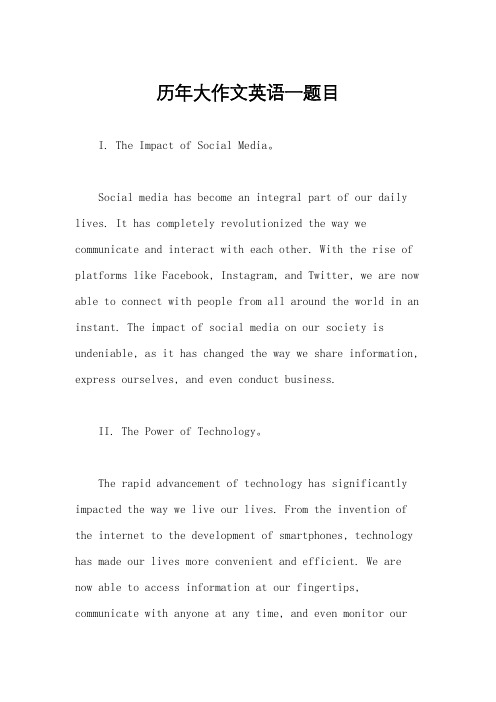
历年大作文英语一题目I. The Impact of Social Media。
Social media has become an integral part of our daily lives. It has completely revolutionized the way we communicate and interact with each other. With the rise of platforms like Facebook, Instagram, and Twitter, we are now able to connect with people from all around the world in an instant. The impact of social media on our society is undeniable, as it has changed the way we share information, express ourselves, and even conduct business.II. The Power of Technology。
The rapid advancement of technology has significantly impacted the way we live our lives. From the invention of the internet to the development of smartphones, technology has made our lives more convenient and efficient. We are now able to access information at our fingertips, communicate with anyone at any time, and even monitor ourhealth and fitness. The power of technology has reshapedour world in ways we never thought possible.III. The Importance of Education。
历年真题作文英语一

历年真题作文英语一1. Well, I guess it's safe to say that we all have our own dreams and aspirations in life. Some of us want totravel the world, while others dream of making a difference in their communities.2. You know, it's funny how life has a way of throwing unexpected curveballs at us. Just when we think we have everything figured out, something comes along to shakethings up.3. Speaking of challenges, I think it's important to remember that setbacks are just a part of the journey. Sure, they can be frustrating and disheartening, but they also have the power to make us stronger and more resilient.4. Let's not forget about the people who haveinfluenced us along the way. Whether it's a teacher who believed in us when no one else did, or a friend who was there for us during our darkest moments, these individualshave played a significant role in shaping who we are today.5. Of course, it's not just about the obstacles we face or the people who support us. It's also about the choices we make and the actions we take. Each decision we make has the potential to lead us down a new and unexpected path.6. And finally, as we navigate through this crazy journey called life, let's not forget to take a moment to appreciate the little things. Whether it's a beautiful sunset, a good cup of coffee, or a heartfelt conversation with a loved one, these are the moments that make it all worthwhile.。
高中英语 高考英语作文例题加范文5篇
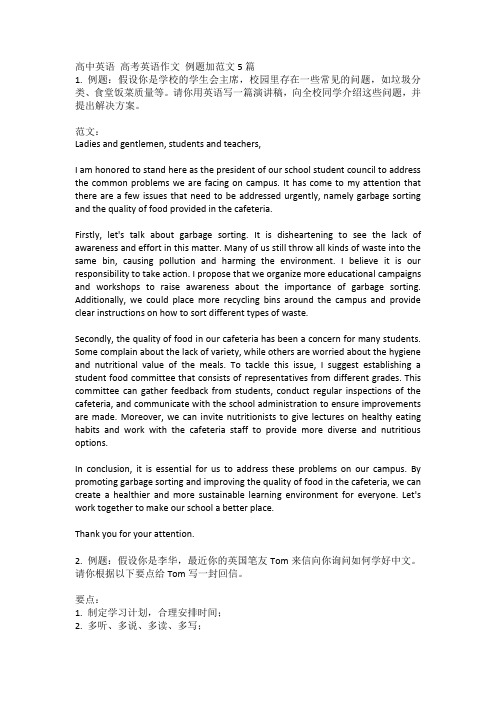
高中英语高考英语作文例题加范文5篇1. 例题:假设你是学校的学生会主席,校园里存在一些常见的问题,如垃圾分类、食堂饭菜质量等。
请你用英语写一篇演讲稿,向全校同学介绍这些问题,并提出解决方案。
范文:Ladies and gentlemen, students and teachers,I am honored to stand here as the president of our school student council to address the common problems we are facing on campus. It has come to my attention that there are a few issues that need to be addressed urgently, namely garbage sorting and the quality of food provided in the cafeteria.Firstly, let's talk about garbage sorting. It is disheartening to see the lack of awareness and effort in this matter. Many of us still throw all kinds of waste into the same bin, causing pollution and harming the environment. I believe it is our responsibility to take action. I propose that we organize more educational campaigns and workshops to raise awareness about the importance of garbage sorting. Additionally, we could place more recycling bins around the campus and provide clear instructions on how to sort different types of waste.Secondly, the quality of food in our cafeteria has been a concern for many students. Some complain about the lack of variety, while others are worried about the hygiene and nutritional value of the meals. To tackle this issue, I suggest establishing a student food committee that consists of representatives from different grades. This committee can gather feedback from students, conduct regular inspections of the cafeteria, and communicate with the school administration to ensure improvements are made. Moreover, we can invite nutritionists to give lectures on healthy eating habits and work with the cafeteria staff to provide more diverse and nutritious options.In conclusion, it is essential for us to address these problems on our campus. By promoting garbage sorting and improving the quality of food in the cafeteria, we can create a healthier and more sustainable learning environment for everyone. Let's work together to make our school a better place.Thank you for your attention.2. 例题:假设你是李华,最近你的英国笔友Tom来信向你询问如何学好中文。
高考英语作文例题加范文5篇
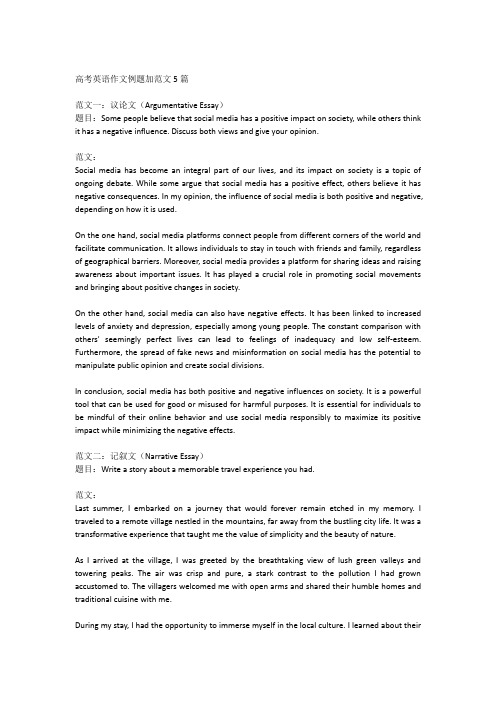
高考英语作文例题加范文5篇范文一:议论文(Argumentative Essay)题目:Some people believe that social media has a positive impact on society, while others think it has a negative influence. Discuss both views and give your opinion.范文:Social media has become an integral part of our lives, and its impact on society is a topic of ongoing debate. While some argue that social media has a positive effect, others believe it has negative consequences. In my opinion, the influence of social media is both positive and negative, depending on how it is used.On the one hand, social media platforms connect people from different corners of the world and facilitate communication. It allows individuals to stay in touch with friends and family, regardless of geographical barriers. Moreover, social media provides a platform for sharing ideas and raising awareness about important issues. It has played a crucial role in promoting social movements and bringing about positive changes in society.On the other hand, social media can also have negative effects. It has been linked to increased levels of anxiety and depression, especially among young people. The constant comparison with others' seemingly perfect lives can lead to feelings of inadequacy and low self-esteem. Furthermore, the spread of fake news and misinformation on social media has the potential to manipulate public opinion and create social divisions.In conclusion, social media has both positive and negative influences on society. It is a powerful tool that can be used for good or misused for harmful purposes. It is essential for individuals to be mindful of their online behavior and use social media responsibly to maximize its positive impact while minimizing the negative effects.范文二:记叙文(Narrative Essay)题目:Write a story about a memorable travel experience you had.范文:Last summer, I embarked on a journey that would forever remain etched in my memory. I traveled to a remote village nestled in the mountains, far away from the bustling city life. It was a transformative experience that taught me the value of simplicity and the beauty of nature.As I arrived at the village, I was greeted by the breathtaking view of lush green valleys and towering peaks. The air was crisp and pure, a stark contrast to the pollution I had grown accustomed to. The villagers welcomed me with open arms and shared their humble homes and traditional cuisine with me.During my stay, I had the opportunity to immerse myself in the local culture. I learned about theirtraditional customs, participated in their festivals, and even tried my hand at farming. The simplicity of their lifestyle and the warmth of their community left a profound impact on me.One particular day stands out in my memory. I hiked to a nearby waterfall with a group of villagers. The journey was arduous, but the beauty that awaited us was worth every step. As we reached the waterfall, I was overcome with a sense of awe and tranquility. The cascading water, the vibrant flora, and the serenity of the surroundings created a moment of pure bliss.This travel experience taught me the importance of disconnecting from the chaos of daily life and reconnecting with nature and ourselves. It reminded me of the simplicity and joy that can be found in the most unexpected places. The memories I made and the lessons I learned during this trip will forever hold a special place in my heart.范文三:说明文(Expository Essay)题目:Discuss the benefits and drawbacks of online learning.范文:Online learning, also known as e-learning, has gained popularity in recent years. It offers numerous benefits, but also has its drawbacks. In this essay, we will explore both the advantages and disadvantages of online learning.One of the main advantages of online learning is flexibility. Students can access course materials and complete assignments at their own pace and according to their own schedule. This flexibility is especially beneficial for individuals who are juggling work or family responsibilities. Online learning also eliminates the need for commuting to a physical location, saving time and money.Another benefit of online learning is the accessibility of a wide range of courses and programs. Students have the opportunity to learn from experts around the world, regardless of their geographical location. This opens up doors to educational opportunities that may not be available locally. Additionally, online learning allows for personalized learning experiences, as students can choose the courses and resources that align with their interests and goals.However, online learning also has its drawbacks. One of the main challenges is the lack of face-to-face interaction with instructors and peers. The absence of physical classrooms can make it more difficult for students to ask questions and receive immediate feedback. Moreover, online learning requires self-discipline and motivation, as students need to stay motivated and organized without the structure of traditional classrooms.In conclusion, online learning offers flexibility, accessibility, and personalized learning experiences. However, it also poses challenges such as limited interaction and the need for self-motivation. Ultimately, the effectiveness of online learning depends on the individual's learning style and their ability to adapt to this mode of education.范文四:观点阐述(Opinion Essay)题目:Do you agree or disagree with the statement: "Money is the key to happiness"? Provide reasons and examples to support your opinion.范文:The statement, "Money is the key to happiness," is a topic of much debate. While some argue that money is essential for a happy life, I believe that happiness is not solely dependent on financial wealth.Money can certainly provide a sense of security and comfort. It allows us to meet our basic needs, such as food, shelter, and healthcare. It also provides access to opportunities and experiences that can enhance our quality of life. However, it is important to recognize that happiness extends beyond material possessions.Numerous studies have shown that once basic needs are met, an increase in income does not necessarily lead to a proportional increase in happiness. Happiness is a complex and subjective concept that encompasses various aspects of life, such as relationships, personal growth, and purpose. These factors cannot be solely obtained through financial means.For instance, research has consistently shown that strong social connections and meaningful relationships are key contributors to happiness. No amount of money can replace the joy and fulfillment that come from spending time with loved ones and nurturing relationships. Similarly, personal growth and self-actualization are essential for long-term happiness. Pursuing passions, learning new skills, and making a positive impact on others' lives are sources of fulfillment that go beyond monetary rewards.In conclusion, while money can provide comfort and opportunities, it is not the sole determinant of happiness. True happiness encompasses various aspects of life that extend beyond financial wealth. It is essential to prioritize relationships, personal growth, and purpose to achieve a truly fulfilling and happy life.范文五:应用文(Application Letter)题目:Write an application letter for a part-time job.范文:[Your Name][Your Address][City, State, Zip Code][Email Address][Phone Number][Date][Employer's Name][Company Name][Company Address][City, State, Zip Code]Dear [Employer's Name],I am writing to apply for the part-time job opportunity at your company, as advertised on [source of job advertisement]. I am excited about the prospect of working with your esteemed organization and believe that my skills and experience make me a strong candidate for this position.I am currently a [grade/college] student with a strong academic record and a passion for [field/industry]. I have gained practical experience through previous part-time jobs and internships, which have allowed me to develop excellent communication, teamwork, and problem-solving skills. I am confident that these skills, combined with my strong work ethic and enthusiasm, would make me a valuable asset to your team.Furthermore, I am highly organized and detail-oriented, ensuring that tasks are completed efficiently and accurately. I am comfortable working in a fast-paced environment and can adapt quickly to changing priorities. Additionally, my proficiency in [relevant software/tools] would enable me to contribute effectively to the work processes at your company.I am available to work [specific days and hours]. However, I am also open to discussing potential schedule adjustments to accommodate both my academic commitments and the needs of the company.I would welcome the opportunity to further discuss my qualifications and how I can contribute to your team. Please find attached my resume for your review. Thank you for considering my application.I look forward to hearing from you soon.Sincerely,[Your Name]。
- 1、下载文档前请自行甄别文档内容的完整性,平台不提供额外的编辑、内容补充、找答案等附加服务。
- 2、"仅部分预览"的文档,不可在线预览部分如存在完整性等问题,可反馈申请退款(可完整预览的文档不适用该条件!)。
- 3、如文档侵犯您的权益,请联系客服反馈,我们会尽快为您处理(人工客服工作时间:9:00-18:30)。
By contrast, Western parents have to tiptoe around the issue, talking in terms of "health" and never ever mentioning the f-word, and their kids still end up in therapy for eating disorders and negative sБайду номын сангаасlf-image. (I also once heard a Western father toast his adult daughter by calling her "beautiful and incredibly competent." She later told me that made her feel like garbage.)
First, I've noticed that Western parents are extremely anxious about their children's self-esteem. They worry about how their children will feel if they fail at something, and they constantly try to reassure their children about how good they are notwithstanding a mediocre performance on a test or at a recital. In other words, Western parents are concerned about their children's psyches. Chinese parents aren't. They assume strength, not fragility, and as a result they behave very differently.
By contrast, I don't think most Westerners have the same view of children being permanently indebted to their parents. My husband, Jed, actually has the opposite view. "Children don't choose their parents," he once said to me. "They don't even choose to be born. It's parents who foist life on their kids, so it's the parents' responsibility to provide for them. Kids don't owe their parents anything. Their duty will be to their own kids." This strikes me as a terrible deal for the Western parent.
Chinese parents can get away with things that Western parents can't. Once when I was young—maybe more than once—when I was extremely disrespectful to my mother, my father angrily called me "garbage" in our native Hokkien dialect. It worked really well. I felt terrible and deeply ashamed of what I had done. But it didn't damage my self-esteem or anything like that. I knew exactly how highly he thought of me. I didn't actually think I was worthless or feel like a piece of garbage.
For example, if a child comes home with an A-minus on a test, a Western parent will most likely praise the child. The Chinese mother will gasp in horror and ask what went wrong. If the child comes home with a B on the test, some Western parents will still praise the child. OtherWestern parents will sit their child down and express disapproval, but they will be careful not to make their child feel inadequate or insecure, and they will not call their child "stupid," "worthless" or "a disgrace."If a Chinese child gets a B—which would never happen—there would first be a screaming, hair-tearing explosion. The devastated Chinese mother would then get dozens, maybe hundreds of practice tests and work through them with her child for as long as it takes to get the grade up to an A.
Chinese parents can order their kids to get straight as Western parents can only ask their kids to try their best. Chinese parents can say, "You're lazy. All your classmates are getting ahead of you." By contrast, Western parents have to struggle with their own conflicted feelings about achievement, and try to persuade themselves that they're not disappointed about how their kids turned out.
Third, Chinese parents believe that they know what is best for their children and therefore override all of their children's own desires and preferences. That's why Chinese daughters can't have boyfriends in high school and why Chinese kids can't go to sleepovercamp. It's also why no Chinese kid would ever dare say to their mother, "I got a part in the school play! I'm Villager Number Six. I'll have to stay after school for rehearsal every day from 3:00 to 7:00, and I'll also need a ride on weekends." God help any Chinese kid who tried that one.
